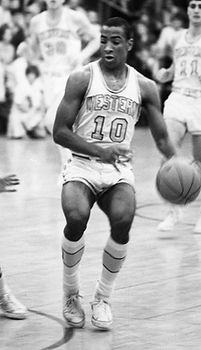Henry Lee Logan
Henry Lee Logan, Western Carolina
Was the first African-American collegiate athlete in the history of the state of North Carolina and possibly at any predominantly white school in the southeastern United States, when he enrolled and played basketball at Western Carolina University in 1964. What the 6-0 shooting/point guard accomplished on the court is nothing short of amazing; yet sadly overlooked by many in the national press and fans in general. As of the end of the 2020-21 season, Logan was the only college player with career totals that exceeded 3,200 points and 1,000 assists. As a senior in 1967-68, he scored 1,049 points, had a nation-leading 36.2 ppg average, and had 298 assists (10.3 apg) - - -all ranking Logan number-one in Western Carolina career annals. He also ranks first in career field goals made and attempted, free throws made and attempted as a result of his senior season. In 107 career games, Logan remains the Catamounts leader in seven statistical categories: points scored (3,290), scoring average (30.7), made field goals (1,263), attempted field goals (2,419), made free throws (764), attempted free throws (1,025), and assists (1,037). His career point total ranks him ninth on the all-time collegiate scoring. He also is credited with 638 career rebounds, which ranks him 18th in in the school record book. His career field-goal percentage of 52.2 and his career free-throw percentage of 74.5 rank Logan eighth and seventh, respectively, in WCU’s records. He holds the program’s record for most points in a single game with 60 in his junior year and nine other games in which he scored 45 or more points. Logan also holds the single-game records for assists (22) and steals (9). The NAIA named him an all-American four times, including three first-team selections, and he also received all-American recognition from the AP and NABC. Named to WCU’s all-20th century team, Logan, whose number-10 jersey is retired, is a member of the of the Western Carolina Hall of Fame (1990) and the North Carolina Sports Hall of Fame (2000). Off the court, Logan also has been acclaimed a leading figure in breaking the color barrier in North Carolina intercollegiate athletics and for his work with youth.


.jpg)


